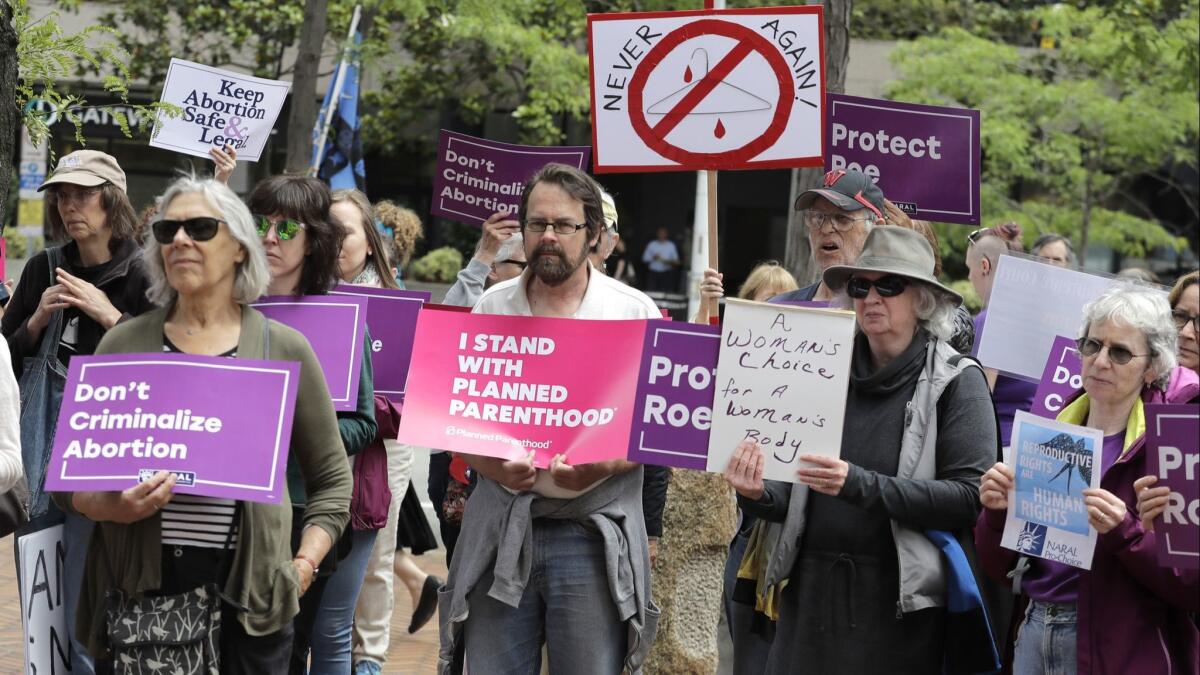Op-Ed: Democrats are entirely too focused on abortion

- Share via
Justice Anthony M. Kennedy’s retirement from the Supreme Court offers President Trump and the conservative legal movement an opportunity to shift the Supreme Court rightward and affect American politics and law for decades to come. What’s most at risk — if you listen to Democratic leaders and progressive advocacy groups — are abortion rights and Roe vs. Wade.
In fact, based on the rhetoric of the past few weeks, you could be forgiven for thinking that abortion was the only issue the high court dealt with. This is not entirely progressives’ fault; conservatives are primarily responsible for making “Supreme Court” another term for abortion politics. Now, Democrats are approaching the nomination of Brett Kavanaugh with the same singular focus. As MoveOn’s Washington director told the Associated Press, when it comes to Trump’s nominee, “the essential message is Roe.”
And yet voters and Democrats’ constituents have a broader set of constitutional concerns: Voting rights, immigration, workplace protections, environmental law and affirmative action are going to be at the mercy of the justices. Out of all the pressing issues the Supreme Court confronts, why should abortion — an issue that divides the Democratic Party as well as the country — marshal such attention? Does it help the party to make abortion rights such a predominant subject? Does it even help the pro-choice cause?
Out of all the pressing issues the Supreme Court confronts, why should abortion marshal such attention?
Until 2016, Democrats approached abortion as a “tragic choice” that nonetheless should remain generally legal and accessible out of deference to women’s health and autonomy. This posture left room in the party for those who support something less than an absolute right to terminate any pregnancy for any reason. A decade earlier, Sen. Charles E. Schumer (D-N.Y.) had affirmed the wisdom of that strategy in his book “Positively American,” a manifesto about how Democrats could permanently “win back the middle-class majority.” His single chapter on a woman’s right to choose was titled “Reduce Abortions by 50%.”
That platform helped Democrats achieve majorities in Congress in 2006 and helped put Barack Obama in the White House after eight years of George W. Bush. But the architects of the modern pro-choice movement wanted more.
When Hillary Clinton was nominated in 2016, Planned Parenthood, NARAL and other groups saw a chance to push a much more aggressive pro-choice position. A Washington Post profile of Cecile Richards, the former head of Planned Parenthood, described the plan this way: “Gone is the vaguely conciliatory mantra of the past, the ideal of keeping abortion ‘safe, legal and rare’ once advocated by Bill and Hillary Clinton. ... [The] party platform … is pushing, for the first time, for full Medicaid funding for abortions. It’s a bold move that positively courts controversy.”
In Clinton’s campaign, perhaps the most significant political marker of the new aggressive strategy was displayed in the third presidential debate. When she was asked about late-term abortion, Clinton did not call for abortions to be rare or note that under Obama, the abortion rate was at its lowest point since Roe was decided in 1973. Instead, she launched into an extended defense of late-term abortion that received rapturous praise from some quarters, with Vogue proclaiming that Clinton “awesomely defended abortion rights.”
Enter the Fray: First takes on the news of the minute from L.A. Times Opinion »
But what pleased Vogue didn’t do much for Clinton or the Democrats in some important states. It didn’t help Katie McGinty, for example, a candidate for U.S. Senate in Pennsylvania, a state with a tradition of victorious pro-life Democrats. When the AP reported on the late-October campaign swing in 2016, the story noted that “the battle to persuade swing voters in Pennsylvania’s close U.S. Senate race includes a heavy emphasis on abortion rights.” McGinty lost by a hair, and it is likely that her opponent, Sen. Pat Toomey, will cast the deciding vote in favor of seating Kavanaugh on the Supreme Court.
Instead of cementing liberal abortion rights and winning governing power for Democrats, the party’s aggressive abortion strategy may have set back women’s right to choose. Since Trump’s 2016 victory, and especially with Kennedy’s retirement, the same groups that have controlled Democratic strategy on these issues are now fundraising off the fact that women’s rights are at “greater risk than ever before.”
Kavanaugh’s confirmation battle may only make matters worse for Democrats. If the message the party delivers during the Senate hearings is single-mindedly focused on Roe and abortion rights, it may discourage support and turnout in many competitive districts crucial to switching the House and Senate from red to blue. (I’m thinking about states in the Southeast, the Rust Belt and Midwest, and even the Mountain West.)
Senate Democrats should forcefully test Kavanaugh’s fitness for the bench. But to the extent the Kavanaugh hearings are going to be a policy referendum, let’s be sure the nation hears from a party that is interested in more than just the fate of Roe vs. Wade.
Michael Wear, who directed faith outreach for the Obama campaign in 2012, is the author of “Reclaiming Hope: Lessons Learned in the Obama White House About the Future of Faith in America.”
Follow the Opinion section on Twitter @latimesopinion and Facebook
More to Read
A cure for the common opinion
Get thought-provoking perspectives with our weekly newsletter.
You may occasionally receive promotional content from the Los Angeles Times.









